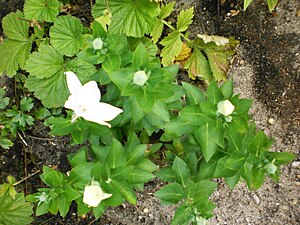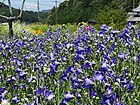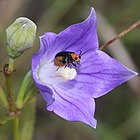Note: This is a project under development. The articles on this wiki are just being initiated and broadly incomplete. You can Help creating new pages.
Difference between revisions of "Platycodon grandiflorum"
(Created page with "{{stub}} ==Uses== {{Uses|}}, {{Uses|}}, {{Uses|}}, {{Uses|}}, {{Uses|}}, {{Uses|}}, {{Uses|}}, {{Uses|}}, {{Uses|}}, {{Uses|}}, {{Uses|}}.<ref name="Uses"/> ==Parts Used== {{...") |
|||
| (2 intermediate revisions by the same user not shown) | |||
| Line 1: | Line 1: | ||
| − | + | [[File:Ballonblume (1).jpg|thumb|right]] | |
| + | '''Platycodon grandiflorus''' is a herbaceous perennial plant that can grow up to 50cm tall | ||
| + | The plant is harvested from the wild for local use as a food and a medicine. The roots are sold as food in local markets in Korea. The plant is cultivated for medicinal use and also sometimes as a food crop. It is often grown as an ornamental. | ||
==Uses== | ==Uses== | ||
| − | {{Uses|}}, {{Uses|}}, {{Uses|}}, {{Uses|}}, {{Uses|}}, {{Uses|}}, {{Uses|}}, {{Uses|}}, {{Uses| | + | {{Uses|Cough}}, {{Uses|Lowers blood sugar}}, {{Uses|Colds}}, {{Uses|Bronchitis}}, {{Uses|Pleurisy}}, {{Uses|Pulmonary abscesses}}, {{Uses|Throat infections}}, {{Uses|Hypertension}}, {{Uses|Diabetes}}.<ref name="Uses"/> |
==Parts Used== | ==Parts Used== | ||
| − | {{Parts Used| | + | {{Parts Used|Young leaves}}, {{Parts Used|Roots}}. |
==Chemical Composition== | ==Chemical Composition== | ||
| − | <ref name="chemical composition"/> | + | It contains eight compounds were isolated and identified as tangeritin, 3-O-beta-D-glucopyranosylplatycodigenin methyl ester, 3-O-beta-D-glucopyranosylplaticogenic acid A lactone, 3-O-beta-D-glucopyranosylplatycodigenin, deapio-platyconic acid A lactone, deapio-platycodin-D, platycoside-G1 and platycoside-E.<ref name="chemical composition"/> |
==Common names== | ==Common names== | ||
| Line 16: | Line 18: | ||
===Dravya=== | ===Dravya=== | ||
===Rasa=== | ===Rasa=== | ||
| − | |||
===Guna=== | ===Guna=== | ||
| Line 29: | Line 30: | ||
==Habit== | ==Habit== | ||
| − | {{Habit|}} | + | {{Habit|Perennial}} |
==Identification== | ==Identification== | ||
| Line 48: | Line 49: | ||
==Mode of Propagation== | ==Mode of Propagation== | ||
| − | {{Propagation|}} | + | {{Propagation|Seeds}}. |
==How to plant/cultivate== | ==How to plant/cultivate== | ||
| − | <ref name="How to plant/cultivate"/> | + | Plants are hardy to about -15°c. Another report says it is hardy to -20°c.<ref name="How to plant/cultivate"/> |
==Commonly seen growing in areas== | ==Commonly seen growing in areas== | ||
| − | {{Commonly seen|}}, {{Commonly seen| | + | {{Commonly seen|Grassy slopes in hills}}, {{Commonly seen|Mountains}}. |
==Photo Gallery== | ==Photo Gallery== | ||
<gallery class="left" caption="" widths="140px" heights="140px"> | <gallery class="left" caption="" widths="140px" heights="140px"> | ||
| − | + | 143862816 624.v1380662115.jpg | |
| + | Aulacophora nigripennis on Platycodon grandiflorus.jpg | ||
| + | Aulacophora nigripennis s2.jpg | ||
| + | Ballonblume (1).jpg | ||
| + | Ballonblume platycodon grandiflorus (2013-07-12 Sp).jpg | ||
</gallery> | </gallery> | ||
| Line 64: | Line 69: | ||
<references> | <references> | ||
| − | <ref name="chemical composition">[ | + | <ref name="chemical composition">[https://pubmed.ncbi.nlm.nih.gov/17144467/ Chemical constituents]</ref> |
| − | <ref name="Leaf">[ | + | <ref name="Leaf">[Morphology]</ref> |
| − | <ref name="How to plant/cultivate">[ | + | <ref name="How to plant/cultivate">[http://temperate.theferns.info/plant/Platycodon+grandiflorus Cultivation]</ref> |
<ref name="Uses">Indian Medicinal Plants by C.P.Khare</ref> | <ref name="Uses">Indian Medicinal Plants by C.P.Khare</ref> | ||
</references> | </references> | ||
==External Links== | ==External Links== | ||
| − | * [ ] | + | * [http://www.missouribotanicalgarden.org/PlantFinder/PlantFinderDetails.aspx?kempercode=c282 Platycodon grandiflorum on missouribotanicalgarden.org] |
| − | * [ ] | + | * [https://www.thespruce.com/how-to-grow-balloon-flowers-4125528 Platycodon grandiflorum on thespruce.com] |
| − | * [ ] | + | * [https://plants.ces.ncsu.edu/plants/platycodon-grandiflorus/ Platycodon grandiflorum on plants.ces.ncsu.edu] |
[[Category:Herbs]] | [[Category:Herbs]] | ||
| + | [[Category:Pages without herbs images]] | ||
Latest revision as of 17:41, 6 July 2020
Platycodon grandiflorus is a herbaceous perennial plant that can grow up to 50cm tall The plant is harvested from the wild for local use as a food and a medicine. The roots are sold as food in local markets in Korea. The plant is cultivated for medicinal use and also sometimes as a food crop. It is often grown as an ornamental.
Contents
- 1 Uses
- 2 Parts Used
- 3 Chemical Composition
- 4 Common names
- 5 Properties
- 6 Habit
- 7 Identification
- 8 List of Ayurvedic medicine in which the herb is used
- 9 Where to get the saplings
- 10 Mode of Propagation
- 11 How to plant/cultivate
- 12 Commonly seen growing in areas
- 13 Photo Gallery
- 14 References
- 15 External Links
Uses
Cough, Lowers blood sugar, Colds, Bronchitis, Pleurisy, Pulmonary abscesses, Throat infections, Hypertension, Diabetes.[1]
Parts Used
Chemical Composition
It contains eight compounds were isolated and identified as tangeritin, 3-O-beta-D-glucopyranosylplatycodigenin methyl ester, 3-O-beta-D-glucopyranosylplaticogenic acid A lactone, 3-O-beta-D-glucopyranosylplatycodigenin, deapio-platyconic acid A lactone, deapio-platycodin-D, platycoside-G1 and platycoside-E.[2]
Common names
| Language | Common name |
|---|---|
| Kannada | |
| Hindi | |
| Malayalam | |
| Tamil | |
| Telugu | |
| Marathi | |
| Gujarathi | |
| Punjabi | |
| Kashmiri | |
| Sanskrit | |
| English |
Properties
Reference: Dravya - Substance, Rasa - Taste, Guna - Qualities, Veerya - Potency, Vipaka - Post-digesion effect, Karma - Pharmacological activity, Prabhava - Therepeutics.
Dravya
Rasa
Guna
Veerya
Vipaka
Karma
Prabhava
Habit
Identification
Leaf
| Kind | Shape | Feature |
|---|---|---|
Flower
| Type | Size | Color and composition | Stamen | More information |
|---|---|---|---|---|
| {{{5}}} |
Fruit
| Type | Size | Mass | Appearance | Seeds | More information |
|---|---|---|---|---|---|
Other features
List of Ayurvedic medicine in which the herb is used
Where to get the saplings
Mode of Propagation
How to plant/cultivate
Plants are hardy to about -15°c. Another report says it is hardy to -20°c.[4]
Commonly seen growing in areas
Grassy slopes in hills, Mountains.
Photo Gallery
References
- ↑ Indian Medicinal Plants by C.P.Khare
- ↑ Chemical constituents
- ↑ [Morphology]
- ↑ Cultivation
External Links
- Ayurvedic Herbs known to be helpful to treat Cough
- Ayurvedic Herbs known to be helpful to treat Lowers blood sugar
- Ayurvedic Herbs known to be helpful to treat Colds
- Ayurvedic Herbs known to be helpful to treat Bronchitis
- Ayurvedic Herbs known to be helpful to treat Pleurisy
- Ayurvedic Herbs known to be helpful to treat Pulmonary abscesses
- Ayurvedic Herbs known to be helpful to treat Throat infections
- Ayurvedic Herbs known to be helpful to treat Hypertension
- Ayurvedic Herbs known to be helpful to treat Diabetes
- Herbs with Young leaves used in medicine
- Herbs with Roots used in medicine
- Habit - Perennial
- Index of Plants which can be propagated by Seeds
- Herbs that are commonly seen in the region of Grassy slopes in hills
- Herbs that are commonly seen in the region of Mountains
- Herbs
- Pages without herbs images





